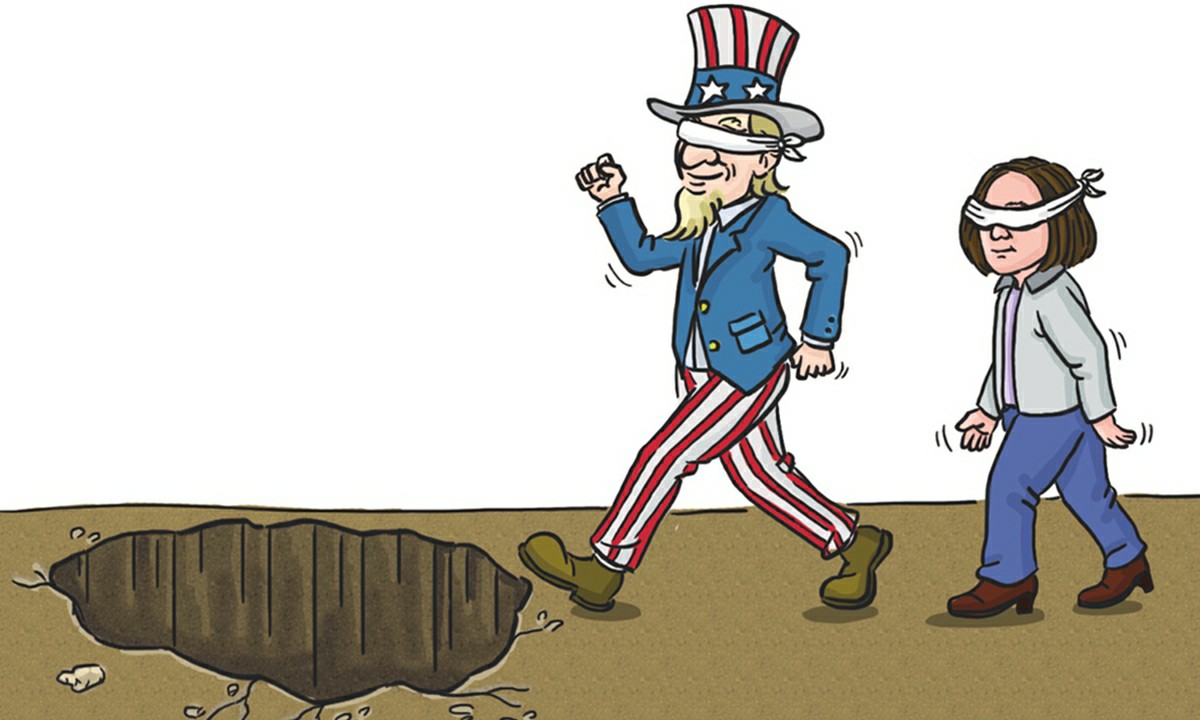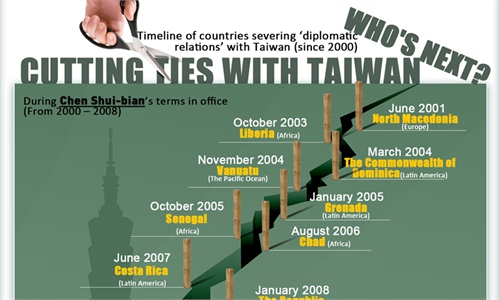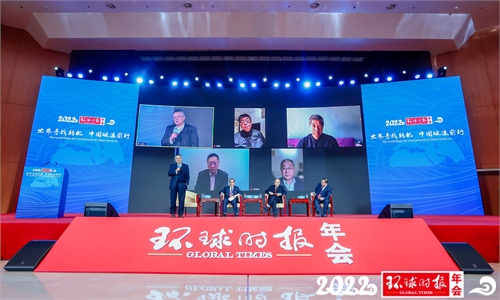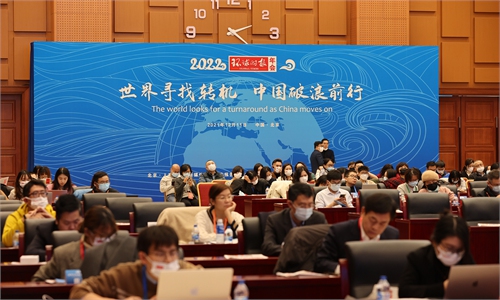Report unveils how cash from Taiwan island into US think tanks results in tougher rhetoric on China

Illustration:Liu Rui/GT
The Taipei Economic and Cultural Representative Office (TECRO) has kept appearing as a major funding source to think tanks in the US, which have made increasingly louder voices to push the US to become more closely involved in the Taiwan question at the risk of having military clashes with China, Alan Macleod, a senior staff writer from US news website MintPress shared with the Global Times on how he found the relationship between the strong upsurge in anti-China rhetoric in Washington and the money pouring in US think tanks from the island of Taiwan.
In April, Macleod released a report on MintPress titled Tanks and Think Tanks: How Taiwanese Cash is Funding the Push to War with China. By studying the financial reports of the island of Taiwan, he found that the island has given out millions of dollars to many of the largest and most influential think tanks in the US in recent years. This has coincided with an increasing number of reports warning of China's economic rise and demanding the US intervene more in disputes between the Chinese mainland and the island.
"I am not, by any means, an expert in Asian politics. I focus mainly on the United States and Latin America. Much of my work entails covering think tanks and how they influence US policy," Macleod told the Global Times.
"I spend a lot of time looking at their output and researching who funds them. Usually, it is corporate American military companies like Lockheed Martin and Raytheon. But the more time I spent reading their financial statements, the more the TECRO kept appearing as a major funding source," said Macleod.
What is TECRO doing this for? Who makes up it and what is its job? According to the three China-US joint communiqués, the US affirmed the People's Republic of China (PRC) is the legitimate government of China and the US agreed to limit Taiwan island's affiliation to informal cultural and commercial relations. After forming diplomatic relations with the PRC in 1979, the US, according to the so-called Taiwan Relations Act (TRA), allowed former organizations from the island to be preserved under the name of "Coordination Council for North American Affairs" which was later changed into TECRO.
Macleod told the Global Times that for such a small island, Taiwan has certainly been spending a lot of money in Washington. In recent years, via TECRO, the island has spent millions of dollars sponsoring many of the biggest and most influential think tanks in America.
He wrote in MintPress that in 2019, TECRO donated between $250,000 and $499,999 to the Brookings Institute. Tech companies have also given large sums to this organization. In turn, Brookings Institute staff like Richard C. Bush, a former member of the National Intelligence Council and US national intelligence officer for East Asia, routinely condemned China's attempts on Taiwan question.
Other US think tanks that have been found receiving donations from TECRO include the Center for Strategic and International Studies, the Atlantic Council and the Hudson Institute.
"Think tanks have a lot of influence on American politics. Their reports become the basis of news reporting and of government policy. They also supply experts to big media outlets to appear on news shows or as sources for articles. Therefore, they help shape both government actions and public opinion on key topics," Macleod said.
Taiwan's Democratic Progressive Party, which is seeking independence, realizes this and has attempted to gain influence in the world by making large donations to a wide range of think tanks in the US, Macleod said, noting that it has worked.?It is not a coincidence that the same think tanks accepting money from TECRO are the ones who are most loudly proclaiming that the US must protect the island of Taiwan from China at all costs.
According to the Foreign Influence Transparency Initiative, seven organizations registered as foreign agents of Taiwan in the US, which contacted 476 Members of Congress, including almost 90% of the House, as well as five congressional committees.
House Speaker Nancy Pelosi was their most frequent contact, the Californian being contacted 34 times. Pelosi has been a great supporter for independence forces on the island of Taiwan, successfully promoting pro-Taiwan legislation and proudly announcing that the US "stands with Taiwan."
In theory, the Freedom of Information Act could enable Americans to explore the nature of their meetings in more detail. In practice, however, it is often difficult to obtain such documents, said Macleod.
Macleod also noted that some think tanks have even set up Taiwan-focused?departments, employed academics from the island, and put out reports hailing Taiwan as a global leader in democracy while presenting China as a danger to Asia and the world. "But doing this while taking cash from the Taiwan authorities is a huge conflict of interest."
An article released by The American Prospect, a daily online and quarterly print American political and public policy magazine in June 2020 put forward similar concerns.
It said that pushing back on bellicose statements from both parties requires credible policy advice from experts with many based at Washington research institutes but five of the most prominent think tanks that have been producing policy papers urging close US relations with the island of Taiwan are pushing for expanding arms sales and trade agreements with the island without widely disclosing their high-level funding from TECRO.
Macleod told the Global Times that think tanks in Washington are already demanding that the US spend far more on its military in order to prepare for conflict with China. "Every dollar spent on missiles and bullets is a dollar taken?away from public schools, hospitals and poverty alleviation programs. War is almost never in the interests of ordinary people - especially a war on the other side of the planet."
"I am no expert, but Chinese military action against Taiwan appears to be extremely unlikely. If it did happen, the US would surely not risk a war with another nuclear power. When it wanted better relations with Beijing in the 1970s, the US turned its back on Taiwan, showing that its friendship is fickle," said Macleod.
In her quest for more independence from Beijing, Tsai Ing-wen is placing a very high-stakes wager, hoping that American protection will help. But by doing so, she is greatly increasing the threat of a military conflict.
Macleod noted that American politicians have no real interest in Taiwan island or its people. However, they are certainly interested in China and its economic rise. The US government is worried that it is losing some of its control over Asia because China is growing stronger,?hence the sudden interest in Taiwan, Hong Kong, Tibet and Xinjiang. Washington sees these as wedge issues that it can use to sow discord and weaken China.
Any lasting solution to the Taiwan question must be diplomatic, not military. Buying more weapons only increases the risk of war, which?could?devastate Taiwan, he noted.




